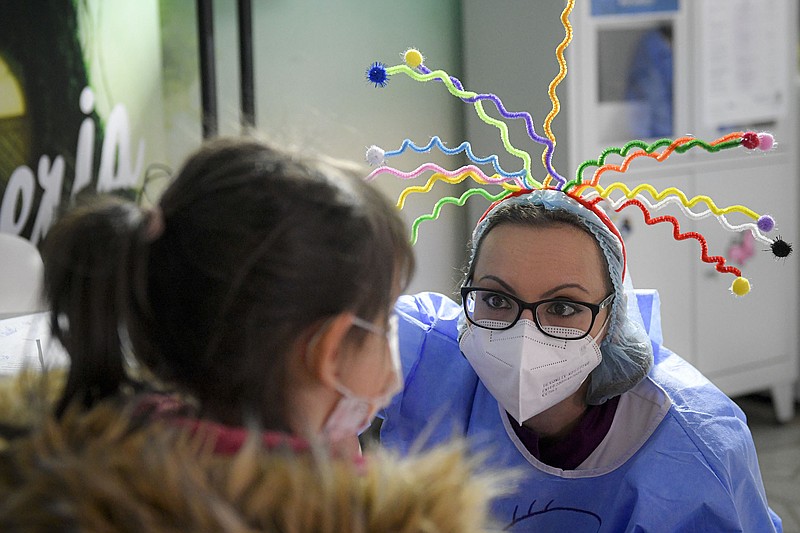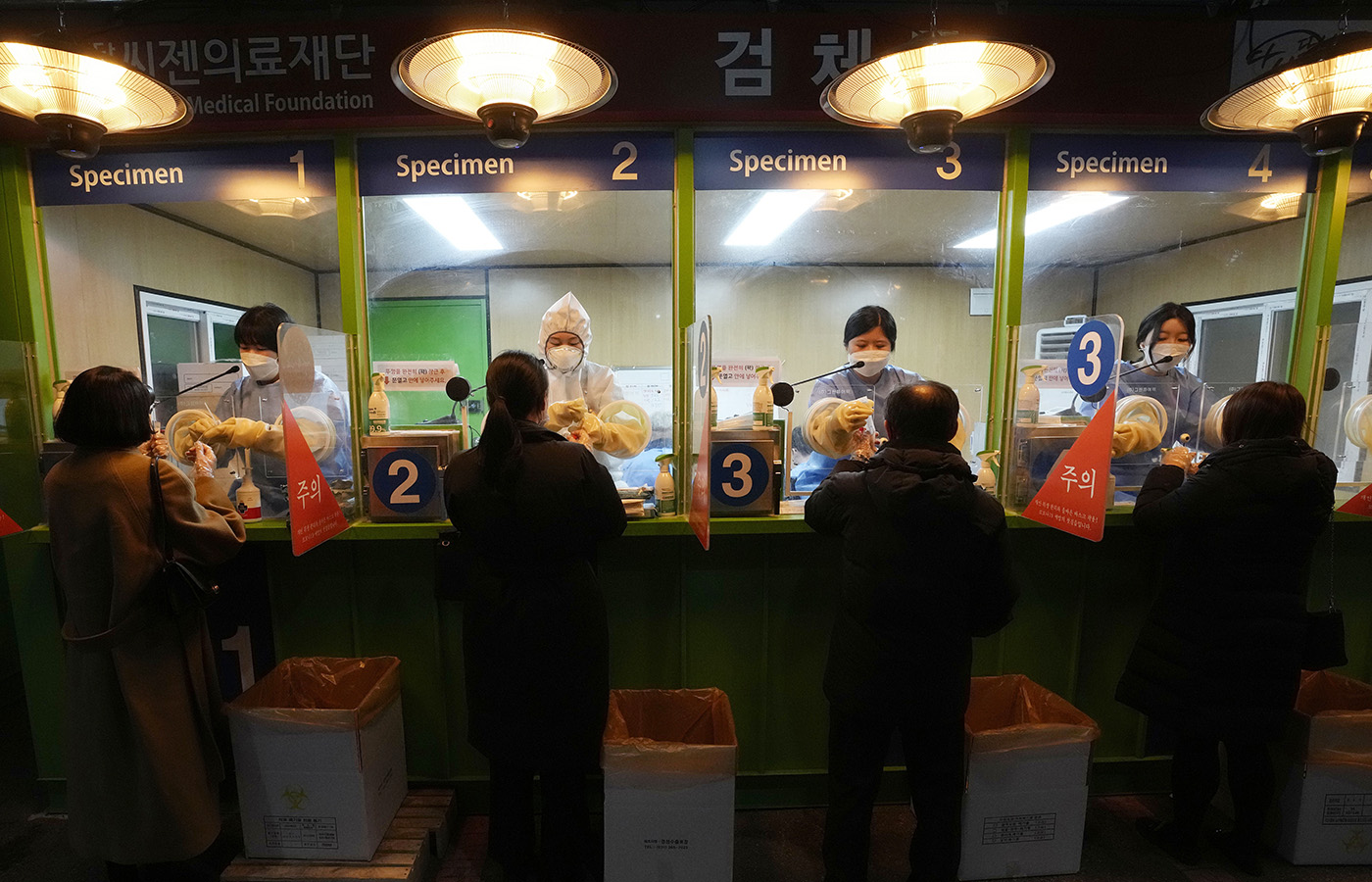BEIJING -- Repeated covid-19 testing of millions of Beijing residents is starting to test the patience of some as the city clamps down on the virus ahead of the coming Winter Olympics.
A third round of mass testing that started Wednesday for the 2 million residents of Fengtai district drew complaints online and from residents bundled up against the wind to wait in line outdoors.
As health workers set up multiple testing stations around the city, there were scattered reports of people being told their testing would be delayed because of a system issue. It was unclear what the problem was and whether it would significantly set back the effort.
Athletes and others participating in the Games are being isolated from the general public to try to avoid cross-infection. Thirteen people who have gone for the Games tested positive Tuesday, bringing the total to 106 among the 3,695 who have arrived. Two of the positive cases are either athletes or team officials.
Those who test positive are taken to a hospital if they have symptoms and to a quarantine hotel if they do not.
Beijing officials said Wednesday that eight people had tested positive in the 24-hour period ending at 4 p.m., bringing the total in the city's delta variant outbreak to 69. Of those, 54 have symptoms and 15 do not.
The numbers are small compared with other countries -- South Korea's latest daily tally topped 13,000 -- but they are a major concern for the government as it prepares to host the Winter Games in nine days.
The Chinese capital has stepped up the country's already strict pandemic response measures. Mass testing of neighborhoods and buildings is being conducted around the city, and the local government announced this week that anyone who buys fever, headache or other cold medicines would have to take a covid-19 test within 72 hours.
[Video not showing up above? Click here to watch » arkansasonline.com/127china/]
GERMAN MANDATE
Germany's parliament Wednesday began a debate on a possible wide-ranging coronavirus vaccination mandate, with three main options on the table so far: obligatory vaccinations for all adults, for just for everyone 50 and above, or no mandate at all.
German politicians of all stripes long insisted that there would be no vaccination mandate. But the tide turned late last year amid frustration that a large number of holdouts was hampering the country's fight against covid-19.
Shortly before becoming chancellor in December, Olaf Scholz came out in favor of a vaccination mandate, predicting that it would take effect in February or early March.
That timetable has slipped. Scholz's new coalition government is leaving it up to lawmakers to come up with cross-party vaccination proposals and then vote according to their conscience rather than along party lines.
That has been done before to tackle ethically complicated medical questions, most recently in 2020 to decide on rules for organ donors.
[CORONAVIRUS: Click here for our complete coverage » arkansasonline.com/coronavirus]
On Wednesday, lawmakers kicked off proceedings with an "orientation debate." It isn't clear when any legislation will go to a vote, but it appears that it could be well into the spring before any vaccination mandate law takes effect.
Three proposals have emerged so far from lawmakers in Scholz's three-party governing coalition.
One is a call for a vaccination mandate for everyone 18 and above, which would be valid for two years and cover a maximum three shots, with fines for holdouts. A rival proposal calls for obligatory counseling meetings for the unvaccinated, followed by a vaccination mandate for people 50 and over if progress is unsatisfactory. And another group wants to prevent any vaccination mandate.
As of Wednesday, at least 73.6% of Germany's population was fully vaccinated -- higher than the European Union average of 70% but lower than in countries such as Spain and Portugal -- and 51.3% also had received boosters. Officials aren't satisfied with that vaccination level.
SWEDEN LIMITS
Sweden announced Wednesday that several coronavirus restrictions will be extended for another two weeks while neighboring Denmark was expected to announce that it no longer considers covid-19 as "a socially critical disease" as of next month and will remove most restrictions.
"We have an extremely record high spread of infection," Sweden's Social Affairs Minister Lena Hallengren said. "The assessment is that existing measures need to remain in place for another two weeks."
"If the situation allows it, the restrictions will be lifted after that," she said.
Karin Tegmark Wisell, head of Sweden's Public Health Agency, said the reasoning for extending the restrictions is that they expect a decline in cases in a couple of weeks. She said the Scandinavian country had 270,000 new infections in the past seven days and "our assessment is that, during this period, at least half a million can fall ill per week."
Sweden has ordered cafes, bars and restaurants to close at 11 p.m., urged people to work from home when possible and said distance learning was an option in higher education to try to combat rising covid-19 infections. Denmark, meanwhile, is heading in the opposition direction.
In a letter Tuesday to the Danish lawmakers, Health Minister Magnus Heunicke said he wants to follow the recommendations by Parliament's Epidemic Commission so that the "categorization of covid-19 as a socially critical disease will be abolished as of Feb. 1."
The letter said "this is a new epidemic situation in which a high and increasing infection does not to the same extent as previously translate into hospitalizations." The letter was obtained by The Associated Press on Wednesday ahead of a planned news conference with Prime Minister Mette Frederiksen.
In Denmark, people older than 15 must also flash the pass when attending outdoor events where the capacity exceeds 2,000.
In Finland, Prime Minister Sanna Marin tweeted that "the government will assess the necessity of [the] restrictions" and "should consider opening low-risk cultural and sports events with a covid pass and extending the opening hours of restaurants on a quicker schedule than was previously estimated."
FRENCH PASSES
France's government will lift its vaccinations pass, which went into effect this week and prevents unvaccinated people from taking part in most social activities, once the number of hospital patients has fallen sufficiently to allow elective surgery to resume.
Even though the omicron variant isn't having as much of an impact on hospitals as previous strains, the occupation rate of beds remains high, French government spokesman Gabriel Attal told reporters after a Cabinet meeting.
New cases totaled 501,635 Tuesday, according to data from the public health office. While the total number of hospitalized patients continues to rise, hitting 30,189 Tuesday, the number of patients in intensive care is lower than it was a week ago.
Information for this article was contributed by Ken Moritsugu, Wayne Zhang, Olivia Zhang, Ng Han Guan, Geir Moulson and staff members of The Associated Press; and by Ania Nussbaum of Bloomberg News.

